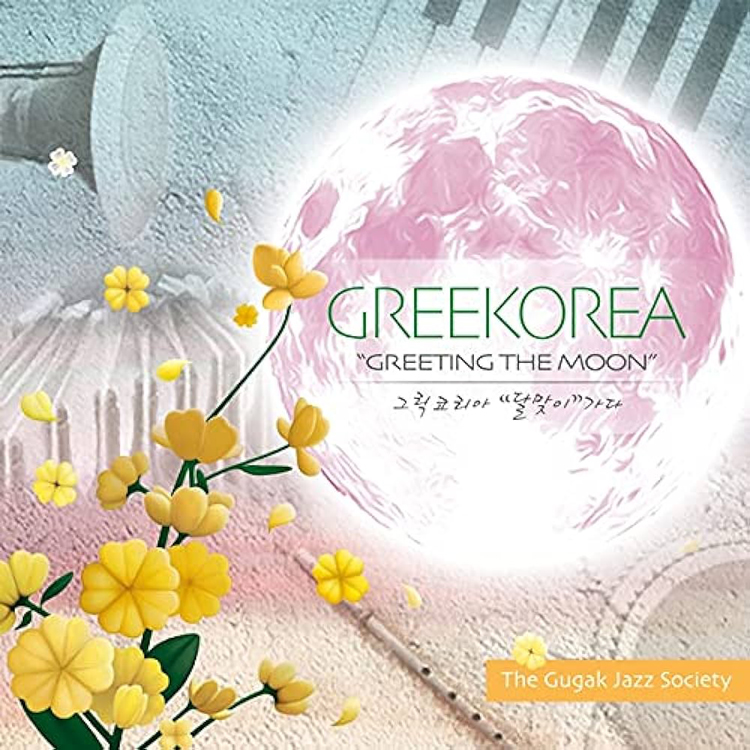Mina Cho – GREEKOREA (International Gugak Jazz Institute, 2021)
GREEKOREA, a captivating series of musical compositions, explores the artistic and cultural affinities that bind the distinct musical traditions of East Asia and the eastern Mediterranean. This innovative exploration serves as a poignant bridge, intricately weaving together the rich Greek and Korean musical heritage. Notably, this union is predominantly facilitated through the expressive lenses of jazz and gospel idioms, which initially beckoned pianist and composer Mina Cho to embark on her musical journey over a decade ago upon her relocation to the United States.
Originally conceived as a live performance slated for May 2020, the cancellation of GREEKOREA amidst the formidable backdrop of the COVID-19 pandemic gave rise to a compelling evolution. Virtual recording sessions emerged, orchestrated across three different countries, punctuated by numerous rehearsals and overdubs. This album now stands as a resounding testament to the resilience and potency of organic musical relationships meticulously nurtured over the course of many collaborative years.
Cho, a pianist immersed in her craft since the tender age of 5, often sought solace in gospel-style improvisations as a refuge from the exacting demands of classical repertory. This predilection deepened during her time as a freshman theology student at Seoul’s Yonsei University when she encountered a gospel chorus delivering a soul-stirring rendition of Psalm 23 in the chapel, rekindling her passion for music.
Following her graduation with a degree in theology in 2005, Cho drew inspiration from Korea’s vibrant gospel and burgeoning jazz scenes. Motivated by the emotional candor in these musical experiences, she embarked on a transformative journey to Boston’s Berklee College of Music. Amidst the thriving musical scene, Cho’s creative spirit was further fueled by the rhythmic nuances emanating from Africa and Latin America. Pianist-composers Fred Hersch and Ben Schwendener emerged as influential figures, guiding her in the art of infusing diverse musical inspirations into a deeply personal compositional voice.
Cho’s exploration of diverse musical cultures expanded to include Mediterranean influences, marked by nearly a decade of collaboration with the Cyprus-born percussionist George Lernis and fruitful exchanges with the Epirus-born lauto player Vasilis Kostas. It was only after immersing herself in these cross-cultural dialogues that Cho redirected her attention to her Korean musical roots. Commencing with the traditional Korean zither, the gayageum, and later embracing percussion, Cho’s musical development traversed a vast spectrum of Korean idioms.
Each track within GREEKOREA serves as a convergence point between the east and west, seamlessly bridging the realms of old and new. “Dalmaji” (Night of the Full Moon) uses the pentatonic melody, which traditionally welcomes the first full moon of Korea’s Lunar New Year, in opulent jazz-gospel harmonies.
“In Mandarin, My Love” breathes new life into a traditional Greek song through Korean translation, punctuated by extended instrumental improvisations. “Milyang Arirang,” a veritable Korean anthem, unfurls amidst the juxtaposition of jagged Korean and Mediterranean rhythms.
In reflecting on the cultural parallels, Cho eloquently articulates, “Culturally, the two countries have much in common. Greece was under the Ottoman Empire for centuries, and Korea was occupied by Japan from 1910 to 1945. They both had a similar relationship with the west.”
Moreover, she emphasizes the unifying power of music across these diverse cultures, noting, “In America, people talk about the ‘blues.’ In Korean music, you have han. The Greeks have rebetiko, which some people actually call ‘the Greek blues.’ But the Korean concept of han isn’t simply about describing these painful struggles but also overcoming them. I think that’s what makes it unique. It’s about transitioning from darkness to something positive.”
Musicians: Mina Cho on piano (USA/Korea); Insoo Kim (Korea) on Korean percussion: janggu, kkwaenggwari, jing, sori-buk; DoYeon Kim (USA) on Korean zither, gayageum; Nayeon Lee (Korea) on Korean wind instruments: piri, saengwhang, taepyungso; Narae Lee (Korea) on vocals in the style of Pansori; George Lernis (USA) on drums and Middle Eastern percussion: darbuka, bendir, riq; Vasilis Kostas (USA/Greece) on Greek lute, lauto; and Max Ridley (USA) on bass.
Buy GREEKOREA.
Mina Cho website: minachojazz.com
International Gugak Jazz Institute


